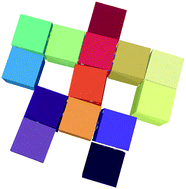Optimising minimal building blocks for addressable self-assembly†
Abstract
Addressable structures are characterised by the set of unique components from which they are built and by the specific location that each component occupies. For an addressable structure to self-assemble, its constituent building blocks must be encoded with sufficient information to define their positions with respect to each other and to enable them to navigate to those positions. DNA, with its vast scope for encoding specific interactions, has been successfully used to synthesise addressable systems of several hundred components. In this work we examine the complementary question of the minimal requirements for building blocks to undergo addressable self-assembly driven by a controlled temperature quench. Our testbed is an idealised model of cubic particles patterned with attractive interactions. We introduce a scheme for optimising the interactions using a variant of basin-hopping and a negative design principle. The designed building blocks are tested dynamically in simple target structures to establish how their complexity affects the limits of reliable self-assembly.



 Please wait while we load your content...
Please wait while we load your content...